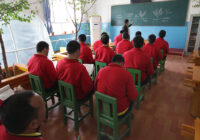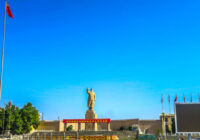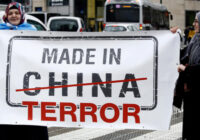On January 25, addressing a virtual World Economic Forum, China’s President Xi Jinping not only strongly advocated for a multilateral approach to the COVID-19 pandemic but insisted on the virtues and systemic benefits of free trade and globalization. Jeopardizing those elements may introduce conflict into the international system, Xi warned, clearly referring to, although not mentioning, the United States. This is not the first time Xi has credited himself as the “champion of globalization,” in particular when attending meetings in Davos. In 2017, in the early days of Donald Trump’s presidency, with the long shadow of barriers to trade and isolationist policies just starting to appear on the horizon, China’s president made important remarks encouraging free trade and opening up the markets.
However, with Trump out and Joe Biden now in the Oval Office, there seems little to suggest any substantial change in US policy, at least in the foreseeable future. If the US isn’t particularly eager to work with China toward free trade and multilateral cooperation, the European Union, and Germany in particular, quickly opted for a completely different approach, signing a key investment deal with Beijing at the end of last year. The Comprehensive Agreement on Investment (CAI) will grant a greater level of market access for investors than ever before, including new important market openings.
Forecasting the US-China Relationship
Washington did not miss the opportunity to express its concerns about a deal that suddenly and unexpectedly sidelined the United States at a moment when, after four years of relative anarchy and opportunism, restarting transatlantic relations should be a priority. Writing in the Financial Times, Gideon Rachman recently pointed out how little sense it makes to rely on a US security guarantee in Europe while undermining its security policy in the Pacific, considering how much Europe has benefitted from the fact that for the past 70 years, the world’s most powerful nation has been a liberal democracy. Germany, in fact, was able over the last decades to exercise a sui generis role of Zivilmacht (civilian power) by framing its national interest in geoeconomic terms, encouraging German exports worldwide while outsourcing its defense to the reassuring presence of US troops.
To better understand Xi’s quasi-imperial stance at the World Economic Forum, it has to be placed not only against the backdrop of the recent investment deals with the European Union or with the 15 countries of the Asia-Pacific region, but on the big news that China is on course to overtake the US as the world’s biggest economy by 2028, five years ahead of earlier predictions, mainly due to the asymmetric impact of COVID-19. While it is clear that China has successfully contained the Sars-Cov-2 outbreak and the Chinese economy is now recovering at a higher speed than other countries, it is also true that a lack of transparency and delays in sharing information with the international community about the virus have contributed to an acceleration of the pandemic at a global level.
Nonetheless, in the current debate over shaping more efficient emergency policies, China is still emerging as the model to follow and imitate, despite being unpopular. There is little doubt that in the “social imaginary” of liberal societies, as reports from Europe and the US suggest, authoritarian regimes are seen by many as more efficient and better prepared to deal with crises than democracies. Yet we must not forget that this efficiency comes at the inevitable cost of political and civil rights.
Xi Jinping is well aware that the Biden administration can finally change course for the US and its allies, forging a united and progressive front after years of populist, nativist and authoritarian politics. Perhaps this element can help understand Xi’s assertiveness at the World Economic Forum better than the recent economic successes. After all, political and civil rights are China’s Achilles’ heel. Criticism of the Communist Party, let alone advocating for basic human rights such as freedom of speech or the rule of law, inexorably leads to repression that falls with equal severity on the rich metropolis of Hong Kong and the poor areas of Xinjiang, sweeping up ordinary citizens and billionaires alike, from Joshua Wong to Jack Ma.
Can China credibly profess the virtues of globalization to achieve harmony and balance in an international system if it doesn’t adhere to international law? Can Beijing speak of cooperation to solve global problems when it has withheld vital information about the threat of the COVID-19 pandemic? As Xi Jinping continues to steer the Middle Kingdom out of its historical isolation, avoiding challenging the United States for the position of world leader will be difficult, given China’s demographics and economic status. Will these two Weltanschauungen, two comprehensively different conceptions of the world, sooner or later present the international community with a choice?
The views expressed in this article are the author’s own and do not necessarily reflect Fair Observer’s editorial policy.
Support Fair Observer
We rely on your support for our independence, diversity and quality.
For more than 10 years, Fair Observer has been free, fair and independent. No billionaire owns us, no advertisers control us. We are a reader-supported nonprofit. Unlike many other publications, we keep our content free for readers regardless of where they live or whether they can afford to pay. We have no paywalls and no ads.
In the post-truth era of fake news, echo chambers and filter bubbles, we publish a plurality of perspectives from around the world. Anyone can publish with us, but everyone goes through a rigorous editorial process. So, you get fact-checked, well-reasoned content instead of noise.
We publish 2,500+ voices from 90+ countries. We also conduct education and training programs
on subjects ranging from digital media and journalism to writing and critical thinking. This
doesn’t come cheap. Servers, editors, trainers and web developers cost
money.
Please consider supporting us on a regular basis as a recurring donor or a
sustaining member.
Will you support FO’s journalism?
We rely on your support for our independence, diversity and quality.






